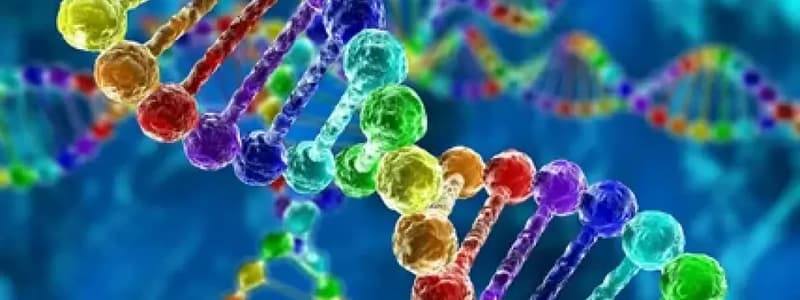Podcast
Questions and Answers
Что является первичным определителем биологического пола?
Что является первичным определителем биологического пола?
- Наследственность пола
- Проявление доминантных генов
- Уровень половых гормонов
- Наличие хромосом X и Y (correct)
Какие хромосомы у женщин и мужчин соответственно?
Какие хромосомы у женщин и мужчин соответственно?
- XX и YX
- YX и XX
- XY и XX
- XX и XY (correct)
Какие гормоны регулируют развитие половых органов у мужчин?
Какие гормоны регулируют развитие половых органов у мужчин?
- Тироксин
- Тестостерон (correct)
- Эстроген и прогестерон
- Интерлейкины
Какие комбинации хромосом могут привести к генетическим состояниям, отличным от XX и XY?
Какие комбинации хромосом могут привести к генетическим состояниям, отличным от XX и XY?
Что может замаскировать рецессивные гены при наследовании пола?
Что может замаскировать рецессивные гены при наследовании пола?
Какие гены могут оказывать влияние на наследование пола, помимо генов, локализованных на половых хромосомах?
Какие гены могут оказывать влияние на наследование пола, помимо генов, локализованных на половых хромосомах?
Какие комбинации хромосом может передать женщина с XX хромосомами своему потомству?
Какие комбинации хромосом может передать женщина с XX хромосомами своему потомству?
Какие комбинации хромосом может передать мужчина с XY хромосомами своему потомству?
Какие комбинации хромосом может передать мужчина с XY хромосомами своему потомству?
Какие шансы у потомства получить X хромосому?
Какие шансы у потомства получить X хромосому?
Что может быть причиной того, что женщина, носившая Y-хромосому в одной из своих клеток, выглядит как женщина?
Что может быть причиной того, что женщина, носившая Y-хромосому в одной из своих клеток, выглядит как женщина?
Зачем важно знание генетики пола?
Зачем важно знание генетики пола?
Как можно использовать знания о генетике пола в генетическом консультировании?
Как можно использовать знания о генетике пола в генетическом консультировании?
Flashcards are hidden until you start studying
Study Notes
Genetics of Sex
Delving into the intricacies of how biological sex is determined and inherited, we'll explore several key subtopics: chromosomes of sex, genetically defined sex, sex hormones, dominant and recessive genes, and the inheritance of sex.
Chromosomes of Sex
The primary determinant of biological sex is the presence of either X or Y chromosomes. Females have two X chromosomes (XX), while males have one X and one Y chromosome (XY). These differences in the sex chromosomes contribute to the development of male and female characteristics.
Genetically Defined Sex
Although the XX and XY patterns are the most common, there are other sex chromosome combinations that can occur naturally, leading to a variety of genetic conditions. For instance, individuals with X0 (Turner syndrome) or XXX (triplo-X) are typically female, while those with XYY (Klinefelter syndrome) are usually male.
Sex Hormones
The development of sex organs and secondary sexual characteristics is regulated by sex hormones (testosterone in males and estrogen and progesterone in females). These hormones, along with other factors, play an essential role in establishing and maintaining sex differences.
Dominant and Recessive Genes
Inheritance of sex chromosomes can also be influenced by other genes located on autosomes, the non-sex chromosomes. Dominant genes can mask recessive genes, meaning that an individual may exhibit a certain trait even if they have one copy of the gene. For instance, females carrying a Y chromosome in one of their cells may appear female due to the dominance of their X chromosomes.
Inheritance of Sex
Inheritance of sex chromosomes follows Mendelian principles, wherein parents pass on one sex chromosome to their offspring. A female with XX chromosomes has two possible combinations to pass on: X or X. In contrast, a male with XY chromosomes has three possible combinations: X, Y, or Y. This results in a 50% chance of offspring receiving an X chromosome and a 50% chance of receiving a Y chromosome.
Implications and Considerations
Knowledge of sex genetics is important for understanding the biological basis of sex and sex-linked disorders. This information can also be valuable in the field of genetic counseling and for parents who have a family history or are at risk of having children with sex chromosome anomalies.
Furthermore, these insights can contribute to our understanding of the complex interplay between genetic and environmental factors in shaping sex and sex differences. At the same time, it's essential that we approach this topic with empathy, respect, and the understanding that every individual's genetic makeup is unique and enriches our collective human experience.
Studying That Suits You
Use AI to generate personalized quizzes and flashcards to suit your learning preferences.




